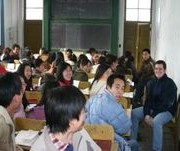Where can I learn Italian in Tuscany?
Currently, Cactus offers four locations in Tuscany where you can take an Italian course – Florence, Siena, Viareggio and the Island of Elba.
Florence
Undoubtedly one of Italy’s most visited cities, Florence, or Firenze as it’s known in Italian, has great historical significance. Its artistic, historic and cultural heritage and impact on the rest of world is massive. Florence is also regarded as one of the most beautiful cities in the world, with buildings and architecture that will take your breath away. You’ll certainly never be short of things to do in Florence with endless sightseeing options and so many possibilities for eating and drinking that your head will spin.
Viareggio
Just down the coast from Pisa on Tuscany’s Versilian Riviera lies the vibrant and up-market seaside resort of Viareggio. It may not be visually as stunning as Florence, but the city has plenty of attractions of its own, including fantastic nightlife, masses of boutiques and galleries and a laid-back Mediterranean atmosphere. It offers a perfect place to combine relaxation and culture, and is perfect for people of all ages.
Siena 
Like Florence, Siena is a city with a rich history and attractive buildings and piazzas. Within its medieval walls lies a maze of inviting narrow streets full of things to explore. Siena is also home to one of the oldest universities in Europe, which ensures a lively student atmosphere and plenty of cultural events. Siena itself is easily explored on foot, although its location close to the Chianti area means that you have easy access via buses and trains to the stunning Tuscan countryside too.
Elba Island 
Located 20km off the Tuscan coast, Elba is often assumed to be its own entity, but it is in fact part of Tuscany. Elba is the third largest island in Italy after Sicily and Sardinia and is famous for its clear waters and stunning natural landscapes. Elba is a great location for any outdoor enthusiasts, with options for water-sports and hiking/biking aplenty. It’s also a food-lover’s haven – as you might expect, seafood dishes are a particular specialty of the region. The course takes place in the exclusive town of Marciana, with a charming seafront promenade, a historic Saracen Tower, colourful streets and a beautiful sandy beach.
NB. Italian courses in Elba running during the summer months only.
Italian courses in Elba

